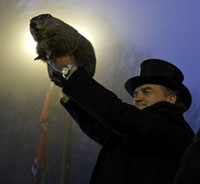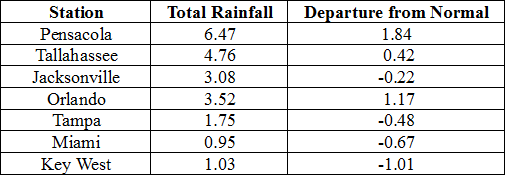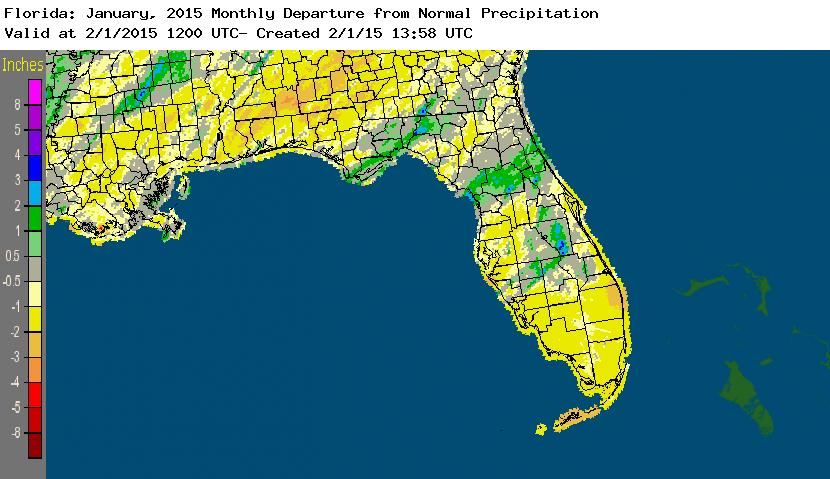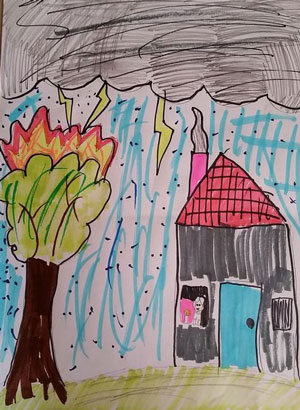Dear Florida Climate Center Friends,
We'd like to present you with the February 2015 edition of our newsletter. In this newsletter, you'll find our monthly climate summary, a list of special events that our staff attended, some pictures, and more. If you have any questions, please email us at climate@coaps.fsu.edu.
Thanks,
The Staff of the Florida Climate Center
 |  |  | David Zierden
State Climatologist | James O'Brien
Professor Emeritus | Melissa Griffin
Asst. State Climatologist |
|
|
Groundhog Day 2015
 On February 2nd, Punxsutawney Phil, the world's most famous weather forecasting groundhog made his prediction for the upcoming spring. Phil has spoken and according to his prediction we are looking at six more weeks of winter. Since 1886, the groundhog has only predicted an early spring 17 times and only has an accuracy of roughly 40%. You can read more about Phil and how his 'forecasts' compare to observations at: Groundhog Day If you are interested in predictions of temperature and precipitation over the next two weeks or out three months, NOAA's Climate Prediction Center has a variety of maps that you can view to see what are the forecasted trends. The maps are available on their homepage at: Climate Prediction Center |
January Climate Summary for Florida
The Florida Climate Center's January 2015 Florida Climate Summary is now available. The summary provides an analysis of temperature and precipitation trends across the state, along with data on hazardous weather, drought, the impacts of the weather and any records tied or broken for the month. During January, average temperatures were varied and rainfall totals were below normal across most of Florida. ENSO-neutral conditions are continuing in the equatorial Pacific. The Climate Prediction Center (CPC) predicts normal temperatures and precipitation for the state through April 2015. Past summaries are archived here.
| January average temperatures and departures from normal (°F) for select cities. |  |
| January precipitation totals and departures from normal (inches) for select cities. |  |
| A graphical depiction of the monthly rainfall departure from normal (inches) for January (courtesy of NOAA, NWS). |  |
|
|
Tools for Making Agriculture More Climate Resilient
 The Florida Climate Institute and Southeast Climate Consortium hosted an AgroClimate training workshop for area farmers and Extension faculty on January 22nd at the Wiregrass Research Center at Headland, Alabama. AgroClimate is an innovative web-resource for decision-support and learning, providing interactive tools and climate information to improve crop management decisions and reduce production risks associated with climate variability, climate change, and extreme weather events. Users can monitor variables of interest such as growing degree days, chill hours, freeze risk, disease risks for selected crops, and current and projected drought conditions. Users can also learn about the impacts of climate cycles affecting the Southeastern United States, such as the El Niņo Southern Oscillation (ENSO). The Florida Climate Center is a long-time partner in the development of AgroClimate and provides data and analysis for the climate risk tools. The Florida Climate Institute and Southeast Climate Consortium hosted an AgroClimate training workshop for area farmers and Extension faculty on January 22nd at the Wiregrass Research Center at Headland, Alabama. AgroClimate is an innovative web-resource for decision-support and learning, providing interactive tools and climate information to improve crop management decisions and reduce production risks associated with climate variability, climate change, and extreme weather events. Users can monitor variables of interest such as growing degree days, chill hours, freeze risk, disease risks for selected crops, and current and projected drought conditions. Users can also learn about the impacts of climate cycles affecting the Southeastern United States, such as the El Niņo Southern Oscillation (ENSO). The Florida Climate Center is a long-time partner in the development of AgroClimate and provides data and analysis for the climate risk tools.
State Climatologist David Zierden opened the workshop with a presentation on the basics of climate variability and how the El Nino/La Nina cycle affects seasonal rainfall and temperature patterns, and ultimately crops. Dr. Clyde Fraissee and Daniel Dourte from University of Florida followed up with a demonstration of the website and tools available on AgroClimate and how they can be used to manage crops and weather-related risks.
|
|
Outreach Activities
Not all of the outreach done by the Florida Climate Center is local or in person. To  accommodate interested 6th graders in a middle school in Sarasota County, Assistant State Climatologist Melissa Griffin worked with their teacher to set up a remote outreach event over Skype. Ms. Griffin talked to the students about different weather related topics, such as thunderstorms and lightning and how they impact Floridians. In addition, she also demonstrated all of the unique features that are available on the Florida Climate Kids Page, including the popular Activity Planner. On January 31st, Ms. Griffin also took part in the Museum of Florida History's Children's Day Outreach Event in Tallahassee, FL. Along with student volunteers, and fellow COAPS Outreach Coordinator Brittany Pace, Ms. Griffin demonstrated how clouds form, the impacts of pressure changes, Bernoulli's Principal, and density properties of various liquids. accommodate interested 6th graders in a middle school in Sarasota County, Assistant State Climatologist Melissa Griffin worked with their teacher to set up a remote outreach event over Skype. Ms. Griffin talked to the students about different weather related topics, such as thunderstorms and lightning and how they impact Floridians. In addition, she also demonstrated all of the unique features that are available on the Florida Climate Kids Page, including the popular Activity Planner. On January 31st, Ms. Griffin also took part in the Museum of Florida History's Children's Day Outreach Event in Tallahassee, FL. Along with student volunteers, and fellow COAPS Outreach Coordinator Brittany Pace, Ms. Griffin demonstrated how clouds form, the impacts of pressure changes, Bernoulli's Principal, and density properties of various liquids.
|
|
Upcoming Events
February 4, 2015:
Farmer's APpreciation Breakfast in Donalsonville, GA
February 6, 2015:
Wiregrass Cotton Expo in Dothan, AL
February 9, 2015:
Tri-State Row Crop Working Group Meeting in Tallahassee, FL
February 21, 2015:
FSU High Magnetic Field Lab Open House in Tallahassee, FL
February 23-24, 2015:
Climate Change In-Service Training in St. Petersburg, FL
April 22-24, 2015:
Southeast Regional Climate Center TAC Meeting in Folly Beach, SC
|
|
Example Data Request

In early January, the Florida Climate Center was contacted by a freelance writer with the National Geographic Kids magazine. The writer was working on an article about interesting summer facts, and was considering doing a piece thunderstorms and lightning in Florida. The climate center was able to provide her with some statistics about the average number of thunderstorms reported across the state, along with some interesting facts about lightning.
|
|
About Us
The Florida Climate Center is part of a three-tiered system of national, regional, and state climate offices, including NOAA's National Climatic Data Center and the Southeast Regional Climate Center. The Florida State Climatologist and other staff at the Florida Climate Center provide the following information and services to the people of Florida:
· Climate Data:
Historical weather observations for weather stations throughout the state of Florida. We are able to provide data for most stations from 1948-present.
· Climate Information:
Long-term historical averages for various stations, climate divisions, and the entire state.
· Extreme Event Records:
Information and analyses on extreme events such as freezes, droughts, floods and hurricanes.
· Special Analysis:
With their vast knowledge of El Niņo, La Niņa and climate variability, the State Climatologist and staff can offer expert insight into Florida's climate trends.
· Outreach:
Activities, presentations, and workshops that inform and educate the people of Florida about current and emerging climate issues. We also coordinate volunteers for the Community Collaborative Rain, Hail & Snow Network (CoCoRaHS).
More About Us
|
|